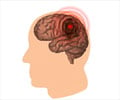A new drug developed as an alternative to popular drug warfarin, also used as rat poison, has been found to significantly reduce stroke risk.
Generally, patients at risk of stroke are given warfarin to prevent blood clotting, but the treatment is risky and requires regular monitoring.In the new study, the doctors found that the new drug, dabigatran (Pradaxa), was 34 per cent more effective at reducing the risk of stroke and blood clots in at-risk patients than well-controlled warfarin.
It also reduced death rates by 15 per cent.
In the three-year long study, the researchers recruited patients with an average age of 71, all of whom suffered from atrial fibrillation, a heart rhythm disorder that greatly increases the risk of stroke.
The British Heart Foundation said that the results for an alternative to warfarin were promising, but the drug would not be available to patients until next year at the earliest.
"Warfarin is a highly effective treatment when indicated for stroke prevention, but it is underused, often because of safety concerns or the need for regular blood tests to monitor its effects," Times Online quoted Keith Muir, a medical advisor for the Stroke Association, as saying.
Advertisement
"However, the trial only involved people who could equally well have taken warfarin, and anyone currently taking warfarin should continue it unless advised by their doctor," he added.
Advertisement
Source-ANI
LIN














